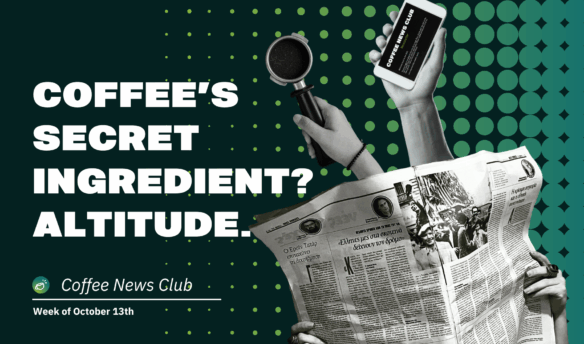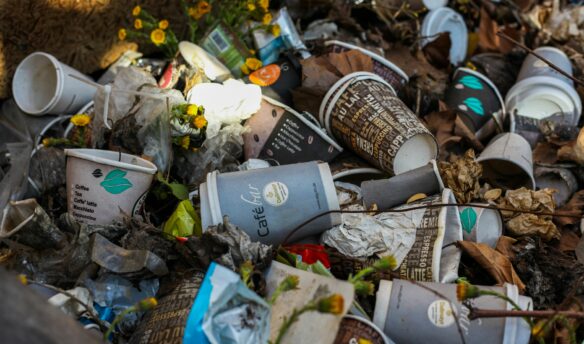Coffee stockpiles are lower than ever in Brazil, Gen Z drives the ‘fourth wave,’ and coffee may help some men with prostate cancer live longer.
Take a sip and let’s get to it.
‘Top Grower Brazil’s Coffee Supplies Have Never Been Lower’ – via Bloomberg
It’s not raining in Brazil—and continued lack of rain could see coffee stockpiles fall to a record low. Brazil’s coffee supply could reach just 7 million 60-kilogram bags by March. According to analysts, a healthy number is closer to 9-12 million.
Brazil is the world’s largest producer of coffee. The global commodity coffee market rises and falls based on what happens in the country—for better or worse. The current poor outlook adds to a general scarcity of coffee supply, as arabica stockpiles monitored by the US Intercontinental Commodity Exchange (ICE) remain at a 23-year low.
In February, the head of Cecafe, Brazil’s governing body for coffee exporting, said that while supplies were lower than hoped, there was “enough to meet demand from local and global industries.” But six months of continued drought has tempered those cautious expectations.
Coffee supply is “so low that even if we have a good crop next year, Brazil may just barely have enough to serve demand,” said Nelson Carvalhaes, a Cecafe board member. “We just need to have the rain.”
This delay will continue to push coffee prices upwards, according to analysts. “Global prices will continue to go up, and the uncertainty on Brazilian supply is one of the main reasons,” said Guilherme Morya, senior economic analyst for Rabobank.
‘From ‘Coffeetok’ Influencers to ‘Textured’ Cold Coffee Drinks, Fourth Wave Coffee is Here, Says Mintel: ‘Expect to See More Brands Take a Less Serious Approach to Coffee” – via Food Navigator USA
Long headline notwithstanding, global research firm Mintel thinks we’re now into coffee’s “fourth wave.” Mintel says the shift in coffee drinking culture is driven by the “easy-going” approach of Gen Z and the growing demand for at-home coffee options.
Mintel says the third wave was quality-focused, “a backlash to the highly flavored, commercialized drinks synonymous with second-wave coffee.” But the fourth wave may partly be a response to “the overly craft (borderline pretentious) nature of third-wave coffee.”
Whatever your thoughts on these statements, it’s undeniable that Gen Z, with the help of TikTok, is driving much of the current coffee culture. TikTok influencers are helping to demystify the industry, while the app’s reach can at least partly explain the massive shift towards cold coffee drinks. The New York Times recently reported that “while the hashtag #hotcoffee has more than 60 million views on TikTok, #icedcoffee has about six billion on the app and is full of videos of users sharing their complicated iced coffee orders.”
But it’s not just about cold drinks. Much of Starbucks’ recently-announced growth strategy focuses more on drive-thru and delivery than its long-trumpeted identity as a “third space,” or the space where people spend time besides work and home. “Starbucks is unlocking the intersection of convenience and connection,” the company said recently, looking to “meet customers wherever they are” by “expanding the Third Place experience beyond the physical store.”
Starbucks’ new direction connects to the other aspect of Mintel’s fourth wave pitch: coffee will become ever more home-focused as “ownership of specialty brewing equipment along with the decline of commutes (due to an increase in remote work) will empower consumers to craft their own specialty coffee drinks at home.” This shift offers opportunities for coffee roasters and complementary categories such as home appliance retailers—Mintel points to Fellow’s recent multi-million funding round as evidence of growth in this area.
According to Mintel, “this bottom-up approach (where trends are set by individual content creators rather than established coffee shops) to fourth-wave coffee will challenge coffee shop culture as influencers primarily share recipes for consumers to follow at home.”
More News
‘SCA Roaster, Barista and Technician Guilds Seeking New Leadership Council Members’ – via Daily Coffee News
‘Crisis-hit German Toilet Paper Maker Turns to Coffee Grounds’ – via The Local
‘ICO Promotes’ Circular Coffee Economy’ as 8th International Coffee Day Approaches’ – via Daily Coffee News
‘Uganda Coffee Exports Plunge 29% in August on Impact of Drought’ – via Nasdaq
‘Royal Coffee Is Raffling Off An Aillio Bullet Roaster Benefitting Grounds For Health’ – via Sprudge
‘Coffee Technicians Guild Summit Coming to Florence in November’ – via Daily Coffee News
The Week in Coffee Unionizing
- Starbucks is ending COVID benefits for all employees—in all stores, unionized or not— next month, despite the company repeatedly saying that it cannot change benefits for unionized workers. Starbucks argues that because COVID-related benefits were temporary, they can cancel them in all stores. ; Organizers called the move “nothing more than union-busting.” Benefits included paid time off to isolate if exposed or to get vaccinated.
- A group of Starbucks investors filed a proposal calling for an audit of workers’ rights, urging for “a third-party assessment of the company’s compliance with its stated commitments to honor workers’ collective bargaining rights.” Investors passed a resolution stating: “We believe the apparent misalignment between Starbucks’ public commitments and its reported conduct represents material reputational, legal, and operational risks and may impact its long-term value.”
- The longest strike in Starbucks’ history ended after 64 days, with both the union and the company claiming victory. Employees of the unionized store in Boston initially walked out after being asked to increase their availability, coupled with issues with understaffing and alleged retaliation. The strikers say they chose to end their standoff after receiving an update that “minimum employee availability would not be enforced at stores that unionized” before July 11th. On the other hand, Starbucks told Restaurant Dive, “the company never negotiated with workers and had made no concessions.”
- According to More Perfect Union’s database, 325 stores in 37 states have so far filed to unionize, with workers victorious in 240 elections. Fifty-three stores have voted against unionizing.
The Week in Corporate Coffeewashing
An article in Fortune Magazine looks at—and applauds—Intelligentsia’s foray into K-cups. The article briefly mentions the environmental impact before focusing on how innovative and popular the move has been.
Intelligentsia, one of specialty coffee’s most famous brands, is now majority-owned by Peet’s Coffee, which not coincidentally is a partner brand of Keurig Dr Pepper. Both are subsidiaries of JAB Holding Company, a private German conglomerate with somewhat of a shady past.
The journey to K-cups began when a study conducted by Peet’s Coffee found that Intelligentsia customers “yearned for accessibility to a Keurig-type home brewing system.” However, the same customers were also wary of the quality single-cup brewers, “along with the environmental responsibility around K-cups.” Intelligentsia CEO James McLaughlin says he shares those concerns, although not enough to stop the project.
The company’s rationale for moving into K-cups is a standard big company justification:
- More people get to try the coffee.
- We sell more coffee.
- We buy more coffee so we can give more money to farmers.
“For us, a lot of good comes from it,” McLaughlin told Fortune.
Meanwhile, Oatly is bringing back its Big Idea Grant for Coffee with this year’s edition offering up to $400,000 in sustainability grants for small US coffee businesses. That “up to” is important because after Daily Coffee News published an article about the project, Oatly reached out to clarify that the award pool is not a guaranteed 400k.
Oatly is the self-proclaimed world’s biggest oat milk company. In 2021, Oatly reported revenue of $643.2 million, with an estimated revenue of $800-830 million for 2022. Among Oatly’s shareholders is the Blackstone Group, whose $200 million investment in 2020 brought criticism from environmental groups over Blackstone’s links to deforestation. In defending the move, Oatly used similar reasoning to Intelligentsia by arguing that the investment allowed them to increase their reach and “help us drive the plant-based movement further” and “steer global capital in a more sustainable direction.”
Is Coffee Good For You?
Researchers from the University of Texas have found that coffee could help some men with prostate cancer live longer. The study, published in the journal European Urology Oncology, found an association between a genotype that quickly metabolizes coffee and extended survival from prostate cancer.
Using data from the PRACTICAL Consortium database with nearly 6,000 patients, a high intake of coffee appeared to be associated with longer prostate cancer-specific survival in those with the CYP1A2 AA genotype.
It’s worth pointing out that it’s not clear how much longer, as the study never gives an exact number in years and repeats that “results were not statistically significant.” But as Medical Xpress notes, research is still in its early stages, and the study itself says that its results “will require further replication.”
Lead study author Dr. Justin Gregg of the University of Texas MD Anderson Cancer Center in Houston said that while there is interest in how to prevent cancers, there aren’t a lot of recommendations for those already diagnosed.
“There’s a chance in the future, with additional research, that looking at things like what to do in your diet based on certain patient groups could be something that is used to augment the care of men who are diagnosed with prostate cancer,” Gregg said.
Beyond the Headlines
‘Eight Questions Sustainability-Minded Roasters Should Ask Importers’ by Jim Ngokwey
‘Cafetano Coffee Roasters Proves How A Producer-Owned Model Can Thrive’ by Abbie Synan
‘In Tea-Loving Kazakhstan, A Coffee Culture Grows’ by Mainbayar Badarch
Coffee News Club is written by Fionn Pooler and the Fresh Cup editorial team.
















